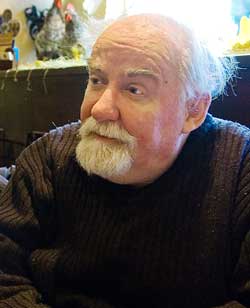McKay takes math beyond moonshine

John McKay has had an influential impact on the field of mathematics.
Rob Maguire
A distinguished mathematician who has made Concordia his home for more than 30 years will be honoured with a conference later this month called Groups and Symmetries: From the Neolithic Scots to John McKay.
It will bring together nearly 50 mathematicians, many of worldwide distinction, from such institutions as Princeton, Cambridge, Harvard, the Max Planck Institute in Bonn and the Ecole Normale Supérieure in Paris, to discuss some remarkable discoveries in modern mathematics initiated by John McKay.
Two of the most notable of these are known as “the McKay correspondence” and “Mon-strous Moonshine.” They both pertain to an area of mathematics known as group theory.
The term “Monstrous Moonshine” was coined by Princeton mathematician John Conway to describe the mysterious connection between two seemingly unrelated domains — sporadic groups and modular invariants — initiated by McKay’s observations. Indeed, when McKay made this discovery in the late 1970s, it was so far ahead of its time that a decade passed before papers were written about it.
As his friend and colleague John Harnad says, McKay’s peculiar genius lies in noticing connections that no one else has seen.
“He doesn’t solve new problems so much as make observations of surprising relations, and pose challenges that sometimes end up pointing to whole new domains of research,” Harnad said with admiration.
McKay attributes his ability to the fact that his knowledge is unusually broad in an era of specialization.
“You have to have a lot of curiosity and do a lot of thinking,” he said simply. “There’s a lot of pressure to find applications, but if you don’t do the basics, you won’t get the applications.”
It’s an aesthetic attraction. Pure math has a beauty that verges on the spiritual. “God created numbers; man created everything else” (Leopold Kronecker, 1823-1891) is a favourite tag for McKay. It’s also a subject filled with paradox.
“Pure math is math that hasn’t happened yet,” McKay said. “We solve problems without understanding them.”
Born in Kent, McKay went to Manchester University in 1958. Though the father of computer science, Alan Turing, had just died, McKay studied under his successor and worked on the world’s biggest and fastest computer. He went on to the University of Edinburgh, where he worked with Douglas Munn on algebra and computing, a combination that deepened into his lifelong specialty.
With doctorate in hand, he moved to the United States, and taught for several years at the California Institute of Technology. The 1960s were tumultuous. He remembers the tussle between supporters of Communist Angela Davis and Caltech’s board of governors, and their strenuous objections to left-wing scientist Linus Pauling getting the Nobel Prize.
McKay found the uproar distasteful, and left. After several years at McGill, he settled at Concordia, where he has been ever since.
Although generally a peaceful man, he has been a bit of a gadfly, pointing out what he saw as administrative mismanagement in areas ranging from the booking of rooms and the accuracy of campus clocks to the appropriate treatment of postdoctoral fellows.
While his interventions have not always been fully understood or appreciated, McKay said simply, “I’m not keen on running the university like a business. There needs to be more communication and accountability.”
He was elected a fellow of the Royal Society of Canada in 2000, and won the 2003 CRM-Fields Prize for Mathematics, the most prestigious distinction given to mathematicians in Canada. He is known worldwide for his contributions, and conferences at mathematical research centres around the world have been devoted to the ideas that he initiated.
The scientific program of the conference to be held April 27 to 29 will take place at the Centre de recherches mathématiques (CRM), on the campus of the Université de Montréal. A number of Concordia professors will take part, including Harnad, who is one of the organizers, David Ford, Hershy Kisilevsky, Dmitri Korotkin, Emmanuel Letellier and David Sevilla-Gonzalez.
Concordia plays an active role in CRM, which is an internationally recognized research centre supported by the federal and Quebec funding agencies, the contributing Quebec universities, and international sources.
As for McKay, he’s focused with typical intentness on getting the conference attendees’ help in solving what he regards as the most basic problem: “to find a natural realization of the Monster as a group of symmetries in a geometric or topological setting.”